Theodora Pavlovitch, choral conductor and professor
Lithuania – the biggest of the Baltic countries – is famous for its choral traditions and many Lithuanian choirs, conductors and composers have earned the respect of the world with their artistic achievements.
Looking to the history of the Lithuanian country, we can find many impressive facts about its development and international relationships. The name of the country appeared for the first time in 1009 AD (Edvardas Gudavičius, Lithuanian History: From Ancient Times to the Year 1569, Vilnius, page 28, ISBN 5-420-00723-1). Established in the 13thcentury, the Grand Duchy of Lithuania was one of the most successful and powerful states on the European continent and in the 15th century it was the largest state in Europe (the present-day territories of Lithuania, Belarus, Ukraine, and parts of Poland and Russia were at that time territories of the Grand Duchy). Meanwhile, at the beginning of the 14th century Christianity was adopted as an official religion by the state. The dynastic union with Poland (formed in 1385) led to a strong relationship between the two big states the consequence of which was the Polish-Lithuanian Commonwealth that lasted until 1795. The expansion of the Russian Empire afterwards erased Lithuania from the European map and Lithuanians lived under the Empire’s rule until the beginning of the 20th century. The Lithuanian state was re-established as independent in 1918 and it remained free until the beginning of World War II, when it was occupied and later absorbed by the Soviet Union. Nearly 120,000 people (5% of the population) were deported and thousands more became political prisoners between 1944 and 1953. Many leading intellectual figures and most Catholic priests were among the deported; many of them returned to Lithuania after 1953. The sovereignty of Lithuania was restored in 1990-1991 with the Act of the Re-Establishment of the State of Lithuania and in 2004 it joined the European Union.
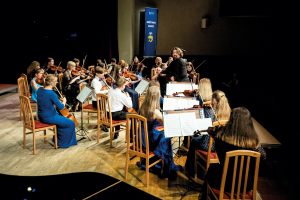
Choral singing has been a significant part of the Lithuanian culture since the end of the 19th century. The first Lithuanian choir made its debut on 17 February 1895 and its concert was given on the occasion of the 10th anniversary of the Lithuanian community “Birutė”. In December 1895 the Tilsit Lithuanian Singers’ Community was founded by Vydūnas (Vilius Storosta). The community used to organise concerts, evenings, St. John’s Day festivities in Tilsit, Klaipėda, Gumbinė, Verdainė, Rusnė, Ragainė, Juodkrantė, Smalininkai. Up to one thousand spectators used to gather at the events, so called the winter and summer Lithuanian celebrations, later in 1902 entitled the Song Celebrations. In 1899 composer Juozas Naujalis rallied the singers of his led Kaunas Cathedral Choir and founded the secret “Daina” community.
The democratic changes in Lithuania in the last decade of the 20th century have brought years of transforming society and as a result Lithuanian choral music has received new energy and a new development. The first in the new history, the Lithuanian Song and Dance Celebration was held in 1994 and included Lithuanian emigrants from the USA, Canada, Australia, Argentina, Germany, Poland, Latvia, Ukraine, Russia and Belarus. 1,200 emigrant singers, dancers and musicians performed together with 26,000 Lithuanian performers. In memory of the organisers of the first Song Celebration of 1924 one of the Song Day’s programmes was rendered at the Kaunas Valley of Songs and the composition dedicated to the Lithuanian Song Celebrations was solemnly presented. The event takes place every four years and this year’s Song Celebration took place from 30 June till 6 July.
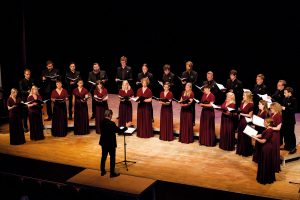
Hundreds of choirs are active in Lithuania nowadays and in Vilnius city alone there are three choir laureates at the European Grand Prix for Choral Singing: Mixed Choir ‘Brevis’ (cond. Gintautas Venislovas) in 2003, Jauna Muzika (cond. Vaclovas Augustinas and Romas Skapas) in 1993 and Chamber Choir of the Conservatoire of Vilnius, (cond. Tadas Sumskas) in 1991. The most famous Lithuanian composer and choral conductor Vytautas Miškinis composed over 400 secular and about 150 religious works performed all over the world.
The programme of Lithuania Cantat embraces six big choral events: the International Choir Festival and Competition named after the Lithuanian Music Patriarch Juozas Naujalis, Sacred Music Festival – Kaunas Musica Religiosa, Kaunas Cantat, Siauliai Cantat, Cantate Domino and the newest among them – the First International Festival and Competition Birštonas Cantat that was held in Birštonas – a beautiful resort and spa town of Lithuania from 17 to 20 May 2018. Choirs and orchestras from Sweden, Poland, Estonia, Russia and Lithuania took part in the event.
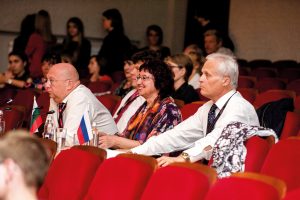
The leading person of the programme Lithuania Cantat and founder of the events is Rolandas Daugela – Associate professor in the Music Gimnasuim of Juozas Naujalis and lecturer at the Music Academy of Vytautas Magnus University. Being famous as conductor of ‘Cantate Domino’ Chamber Choir, VMU Academic Choir ‘Vivere Cantus’ and the Junior Choir of ‘Juozas Naujalis’ Music School, he has been also a chief conductor of Kaunas’ and the Lithuanian World Song Celebration. As a member of Jury he has taken part in different choral competitions and festivals in Italy, Poland, Latvia, The Czech republic, Slovakia and Macedonia. In 1992 he set up the events of the programme Lithuania Cantat and has been their Artistic Director since then.
The other important and full of energy person behind the stage of Birštonas Cantat is the Festival’s manager Silvija Prockyte – member of the Youth Committee of the European Choral Association – Europa Cantat and choirmaster of ‘Vivere Cantus’ VMU Academic Choir.
Both of them and their team created the brilliant organisation and wonderful atmosphere of the Birštonas CantatFestival that made all the choirs and orchestras participating in the Festival happy and inspired to show their best qualities in the Festival’s programme.
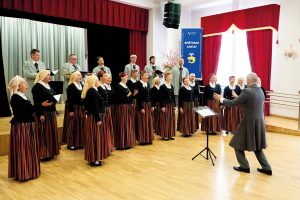
A special guest choir of the Festival was the famous Sofia Vocal Ensemble (Stockholm, Sweden) conducted by Bengt Ollen. The choir won the European Grand- Prix for Choral Singing in 2012 and was among the choirs invited to perform at the 10th World Symposium on Choral Music in Seoul, South Korea in 2014. Sofia Vocal Ensemble performed at the Opening Concert of the Birštonas Cantat Festival a wonderful programme under the title ‘Sun, Sea and Hope’ consisting of contemporary and traditional pieces by Swedish and other European composers.
Over the next days of the Festival’s programme the participating choirs and orchestras presented their programmes in the beautiful concert halls of the Birštonas Cultural Centre and Birštonas Kurhaus.
The winners of the Gold awards of the Festival wereas follows:
- Senza Rigore Chamber Choir of the Karol Lipinski Academy of Music in Wroclaw, cond. Jolanta Szybalska-Matczak (Poland) in Categories ‘Musica Sacra a Cappella’ and ‘Youth and student’s choirs’,
- Mixed Choir ‘Tume’, cond. Rudolfs Bacans (Latvia) in Category ‘Adult Choirs’,
- The Vocal Quartet of Juozas Gruodis Conservatory, cond. Raimonda Navickiene and Rasa Ivanauskiene (Lithuania) in Category for ‘Pop- and Jazz’ music;
- Young Symphonists of Saint-Petersburg, cond. Dmitry Vorobjev (Russia) in Category ‘Youth Orchestras’.
- The Police Choir ‘Chorus Menticum’ (Tartu, Estonia) was awarded a special prize for their unique expression and attractive programme.
The goals of the new Festival of preserving the choral traditions, developing new genres in choral music and uniting choirs and youth orchestras from different countries and national cultures have been fulfilled! The organisers of the Birštonas Cantat Festival, 2018, deserve standing ovations for their wonderful team-work, for their enthusiasm and great energy! They have proved how a new choral event can be made very successful by good vision and a high spirit and we are all looking forward to seeing the next editions of the International Festival for Choirs and Orchestras Birštonas Cantat!
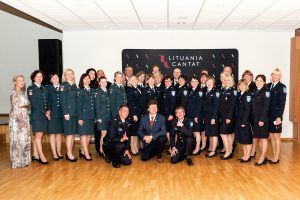
Theodora Pavlovitch is Professor of choral conducting and Head of the Conducting Department of the Bulgarian National Academy of Music. Conductor of the Vassil Arnaoudov Sofia Chamber Choir and the Classic FM Radio Choir (Bulgaria). In 2007/2008 she conducted the World Youth Choir, honoured by UNESCO with the title Artist for Peace, recognizing the WYC’s success as a platform for intercultural dialogue through music. Prof. Theodora Pavlovitch is frequently invited as a member of Jury panels to a number of international choral competitions, as conductor and lecturer to prestigious international events in 25 European countries, USA, Japan, Russia, China, Hong Kong, Taiwan, South Korea, Israel. Since 2012, T. Pavlovitch has been a representative for Bulgaria in the World Choral Council. Email: theodora@techno-link.com
Edited by Katy Harris, UK

